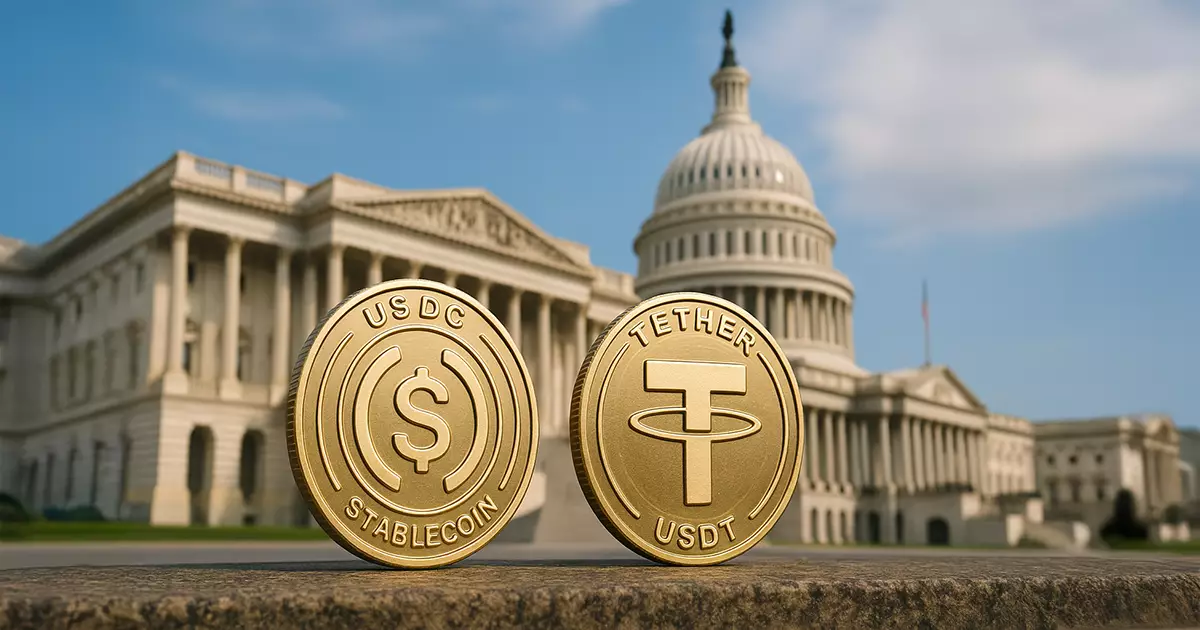The recent announcement from nine Democratic Senators expressing their withdrawal of support for the GENIUS Act marks a significant crossroads in the evolution of stablecoin legislation in the United States. This new wave of skepticism not only illustrates the complexity of bipartisan cooperation but also illuminates the stark contrast between regulatory assurance and the pace of innovation. It reveals the depth of concern around essential issues such as consumer protection, national security, and the overall health of the financial ecosystem.
The Senators’ joint statement reflects their discontent with the bill’s existing framework—an ambitious attempt to set forth a regulatory model for U.S. stablecoins. Their determination to withhold support until substantial changes are made raises critical questions. Are we witnessing a thoughtful precaution from elected representatives, or are we, instead, entangled in bureaucratic stalling that could impede progress in an industry that is growing exponentially?
Flaws in the Current Bill and the Call for Bipartisanship
As the party members voice their discontent, the Senate Democrats emphasize a need for strengthened provisions concerning anti-money laundering, national security, and accountability—a stance that all rational citizens should endorse. In a political environment where transparency is a necessity, the absence of vigilant regulation leaves consumers exposed to fraud and abuse, especially in a relatively nascent market like stablecoins, which operate at the crossroads of finance and technology.
However, the insistence on bipartisanship can be both a double-edged sword and a testament to the legislative process. While harmonious cooperation across party lines is laudable and often essential in crafting durable legislation, the current situation risks becoming a sluggish feud where political gains overshadow the urgent need for protective measures. The Senators’ insistence on enhancements not only reflects their commitment to safeguarding citizens but also portrays the intricate balance of advancing fiscal innovation without relinquishing accountability.
Legitimate Concerns from Various Stakeholders
The voices of dissent extend beyond these nine Senators. Prominent figures like Senator Elizabeth Warren express their concerns vocally, warning that enabling big tech to issue their own stablecoins may lead to a chaotic marketplace, driven more by profit than the welfare of users. Additionally, a collective of 20 community banking organizations has rallied against the bill, arguing that the GENIUS Act could potentially disrupt traditional banking frameworks while exposing the system to unforeseen risks.
This discontent is hardly the noise of a few naysayers; it reflects widespread apprehension within the financial community that demands immediate attention. If the file of legislation passes without essential safeguards, it may not only jeopardize consumers’ interests but also reverberate throughout the economy. In a climate where traditional banking systems are already under pressure from the burgeoning fintech landscape, the last thing we need is to quiet voices of caution.
Balancing Innovation with Consumer Safety
The tension between innovation and regulation in financial markets is nothing new. Proponents of the GENIUS Act assert it could spearhead a regulatory framework that solidifies America’s leadership in digital currency, something that deserves a nuanced examination. However, it is essential to interrogate one fundamental question: who benefits from this legislation, and at what cost?
Despite ambitions to elevate the U.S. digital asset landscape, the potential pitfalls of rushing toward deregulation are glaring. Financial institutions seeking to innovate must proceed with caution, ensuring that consumer safety remains at the forefront. By setting rigorous standards, the government can foster an environment of innovation that thrives alongside robust consumer protections—an equilibrium that should not be dismissed in any legislative endeavor.
Looking Ahead: The Path Forward
The political chess game surrounding stablecoin legislation will undoubtedly continue to evolve. Both the Republican and Democratic leaders have demonstrated willingness to negotiate, as reflected in reported amendments to appease their colleagues. However, whether these changes genuinely address critical concerns, or merely serve as political placation, remains in question.
In this moment, it is crucial that Senators engage in constructive dialogue aimed at refining policy rather than entrenching positions. Ensuring that the GENIUS Act embodies the duality of innovation and protection is not merely a legislative necessity; it is a moral obligation to every consumer involved in or affected by the transformation of our financial system.
As the stakes rise, it is clear that advancing legislation to harness the potential of stablecoins is paramount, but it must reflect a commitment to safeguarding both innovation and those who utilize these financial tools. The upcoming days will be pivotal in determining not just the fate of the GENIUS Act, but the trajectory of how America handles the future of money itself.















